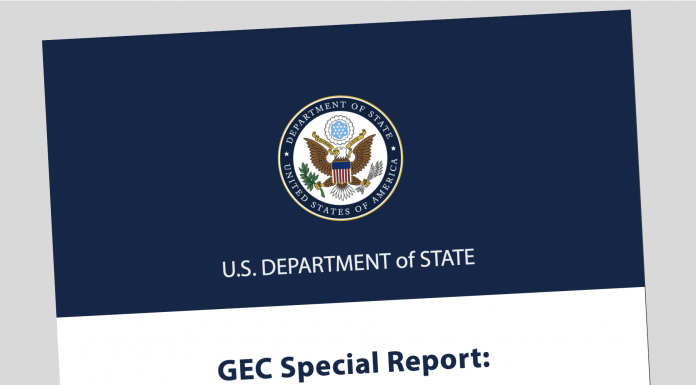WASHINGTON (Reuters) – The United States has identified three online publications directed by Russia’s intelligence services that it says are seeking to undermine COVID-19 vaccines produced by Pfizer and Moderna, a State Department spokeswoman said on Sunday.
The outlets “spread many types of disinformation, including about both the Pfizer and Moderna vaccines, as well as international organizations, military conflicts, protests, and any divisive issue that they can exploit,” the spokeswoman said.
The Wall Street Journal (WSJ) first reported on the identification of the alleged campaign on Sunday. A Kremlin spokesman denied the U.S. claim Russia was spreading false information about vaccines to the WSJ.
Russia’s embassy in Washington did not immediately respond to a request for comment.
Russia approved its Sputnik V vaccine in August, before a large-scale trial had begun, saying it was the first country to do so for a COVID-19 shot … Click source below to read more.
Russian Disinformation Campaign Aims to Undermine Confidence in Pfizer, Other Covid-19 Vaccines, U.S. Officials Say
Websites linked to Russian intelligence services publish false information questioning vaccines’ safety, efficacy
WASHINGTON—Russian intelligence agencies have mounted a campaign to undermine confidence in Pfizer Inc.’s and other Western vaccines, using online publications that in recent months have questioned the vaccines’ development and safety, U.S. officials said.
An official with the State Department’s Global Engagement Center, which monitors foreign disinformation efforts, identified four publications that he said have served as fronts for Russian intelligence.
The websites played up the vaccines’ risk of side effects, questioned their efficacy, and said the U.S. had rushed the Pfizer vaccine through the approval process, among other false or misleading claims.
Though the outlets’ readership is small, U.S. officials say they inject false narratives that can be amplified by other Russian and international media.
“We can say these outlets are directly linked to Russian intelligence services,” the Global Engagement Center official said … Read more (subscription required)
GEC Special Report: Russia’s Pillars of Disinformation and Propaganda
OFFICIAL RELEASE – The Department’s Global Engagement Center (GEC) is leading and coordinating efforts of the U.S. Federal Government to recognize, understand, expose, and counter foreign propaganda and disinformation.
In line with its congressional mandate, the GEC is releasing a special report that provides an overview of Russia’s disinformation and propaganda ecosystem.
The report outlines the five pillars of Russia’s disinformation and propaganda ecosystem and how these pillars work together to create a media multiplier effect. In particular, it details how the tactics of one pillar, proxy sources, interact with one another to elevate malicious content and create an illusion of credibility.
While Russia’s disinformation presents a threat, it does not stand unopposed. The U.S. government, our allies and partner governments, international institutions, civil society, academia, the private sector, and citizens around the world will not stand by idly while Russia misuses the modern forms of communications that we all depend on for the free flow of ideas and information.
The GEC will continue to expose disinformation we see coming from Russia and other malign actors so that the international public and the counter-disinformation community have a clear understanding of how disinformation spreads and how we can work collectively to counter it.
Download the report [11 MB] here.



